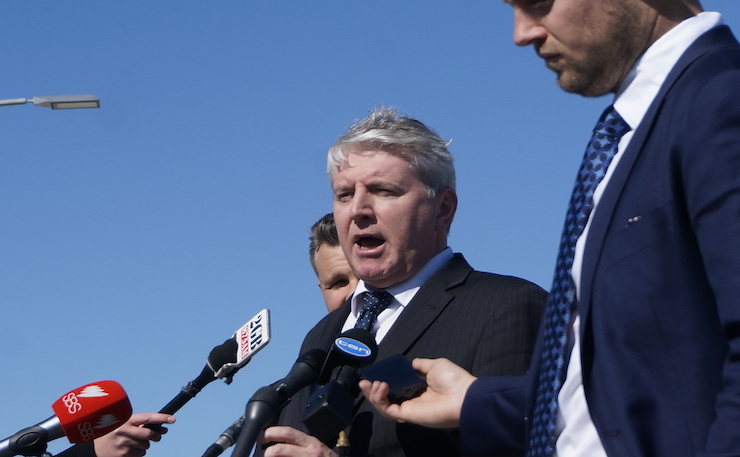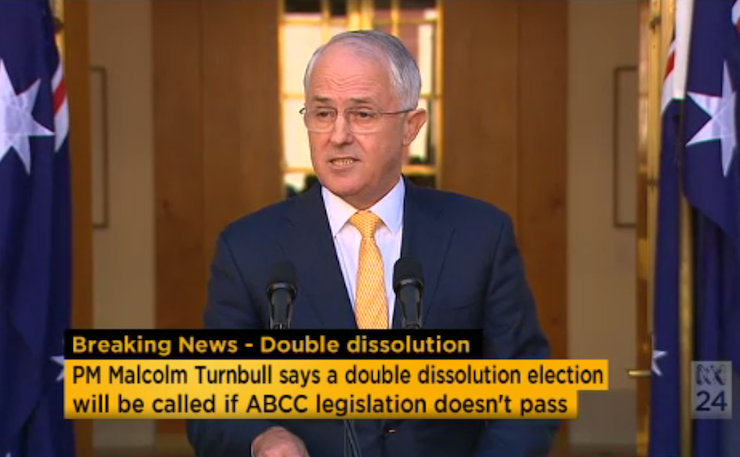ANALYSIS: With Tony Abbott stalking, and Bill Shorten growing into his role, Turnbull’s bare policy agenda has left the PM vulnerable. Ignore the insiders, the double-dissolution gamble is a desperate distraction, writes Ben Eltham.
After months of prevarication, Malcolm Turnbull has finally acted.
At a media conference yesterday, the Prime Minister announced he would be recalling parliament to debate stalled legislation to re-establish the Australian Building and Construction Commission and toughen union official regulations with a Registered Organisations Bill. If the bills don’t pass, he’ll call a double-dissolution election for July 2. The federal budget will also be moved forward a week.
The Canberra press gallery has been beside itself with glee at Turnbull’s tactics. Fairfax’s Peter Hartcher gushed that “Malcolm Turnbull has transformed his prime ministership at one stroke.” Mark Kenny reached for his phrase book: “In one fell swoop, the Prime Minister has taken control of a sea of floating imponderables.” On the ABC, Annabel Crabb lauded it as a “classically Turnbullian manoeuvre.” Michelle Grattan called it “confrontationist but canny.” Sean Kelly repeated the “bold and audacious” consensus. A notable exception was Tim Dunlop.
Not for the first time, the press gallery is wrong. As Dunlop argued today, Turnbull’s decision to call on an early election is not bold. It’s desperate.
The most obvious conclusion is that Turnbull has pulled the trigger on an early election because he has run out of ideas.
The Coalition is drifting downwards in the polls. Turnbull cannot control his own party room, as the Safe Schools debacle has demonstrated. He has completely failed to advance any kind of policy agenda.
This is not a tactical masterstroke, but rather the kind of half-smart political manoeuvre that has blown up in Turnbull’s face before. Cast your minds back to 2009’s “ute gate”: the disastrous own goal in Turnbull’s stint as opposition leader, when Turnbull called on Kevin Rudd to resign the prime ministership over explosive allegations made by a public servant, Godwin Grech.
Grech turned out to be making it up. He had fabricated the crucial email. The overreach left Turnbull’s credibility in tatters.
Yesterday’s announcement poses similar risks. Once again, it’s all about tactics, not policy. The Australian Building and Construction Commission legislation was last voted on in August 2015. The government has been in no rush to debate it again since.

As Labor’s Brendan O’Connor pointed out this morning, “the other bill the Prime Minister is pretending to rely upon, the Registered Organisations Bill, is not even in the Parliament – and hasn’t been since August 2015.”
By recalling Parliament with a constitutional oddity, Turnbull has fascinated the Canberra insiders. But ordinary citizens are likely to be nonplussed. Most of us expected an election in September or October or even November – the full term that Turnbull repeatedly promised.
Instead, we’re consigned to what is effectively an 14-week election campaign. Long election campaigns are never popular with voters, who get pretty sick of politics pretty quickly. The likelihood is that most voters will ignore the froth and bubble until much closer to election day. By then, they may well be in a mood to punish the government that has inflicted the endless campaign. This is not the “traditional government” Turnbull told us about when he took over in September.
The last time we had a double-dissolution election, preceded by long election campaign, was in 1984. Bob Hawke was also a personally popular and charismatic prime minister, but he was pushed close by Andrew Peacock. Labor suffered a two per cent swing against it. A similar swing would see the Turnbull government in deep trouble.
The argument put by Turnbull yesterday was that “the time for playing games is over.”
The time for game playing is over. Parliament has been recalled to consider the ABCC and Registered Organisations Bills.
— Malcolm Turnbull (@TurnbullMalcolm) March 20, 2016
And yet, despite the breathless commentary, it’s not at all clear that recalling Parliament and issuing it with an ultimatum ends the game-playing or the uncertainty.
The more you examine the detail of yesterday’s announcement, the more risks and uncertainties it poses for the government.
For instance: the budget. The budget has been brought forward a week, to May 3. But no-one bothered to tell Treasurer Scott Morrison. You’ve got to feel for the hard-working bureaucrats in the Treasury, who will now have to slave through some very late nights to get a manifestly struggling Treasurer ready for his big night.
A stumbling performance from Morrison on May 3 – for instance, a budget that repeated Joe Hockey’s nasty cuts aimed at Australia’s neediest – would be a dangerous way to kick off an election campaign.
Nor is the issue of union corruption necessarily a winner for the government. The issue at hand – the Australian Building and Construction Commission – is of marginal importance, at best.
Ordinary voters have little understanding or even knowledge of the problems in the construction industry. The Royal Commission into Trade Union Governance and Corruption has largely already been forgotten. The idea that three weeks of political theatre in the Senate will somehow focus this election on the issue of union corruption is laughable.
Moreover, if voters do focus on the issue, it’s likely they will find the arguments mounted by the crossbenchers and Labor quite attractive. Senators like Glenn Lazarus want the ABCC expanded into a federal anti-corruption commission in the mould of New South Wales’ ICAC.
There’s a lot to like about such a proposal. There is almost certainly a need for a federal anti-corruption body. And why should an anti-corruption watchdog be limited to a single industry? The industry with the worst track record in recent years has unquestionably been banking and finance: just yesterday, Elmer Funke Kupper, the CEO of the Australian Stock Exchange, was forced to step down over a corruption investigation.
If the crossbenchers and Labor amend the ABCC legislation to make it a whole-of-government corruption watchdog, would the government really veto that? By doing so, the government would remove any doubt that its intentions are to smash unions, rather than address corruption.
Like any other election campaign, it’s likely that 2016 will ultimately come down to the bread-and-butter issues of public services and the economy. It may be that Turnbull believes he can win by scaring voters over Labor’s negative gearing policy.
But Labor has been preparing for a July 2 election for weeks now. The opposition has released an impressive suite of policies, most of which are costed and detailed. Bill Shorten has lifted his game, a development few thought likely. Labor enters the de facto election campaign only slightly behind the government in most published polls. It’s a position the Labor strategists would like.
Has Turnbull really pulled off a master stroke? Only time will tell. But there is one thing – one person, actually – that he cannot control.
There’s one man that you can bet will have a lot to say in coming weeks. He is a man proven to be Australia’s most damaging political attack dog. He has the capacity to profoundly hurt Malcolm Turnbull’s election campaign.
That man is Tony Abbott.
Donate To New Matilda
New Matilda is a small, independent media outlet. We survive through reader contributions, and never losing a lawsuit. If you got something from this article, giving something back helps us to continue speaking truth to power. Every little bit counts.





